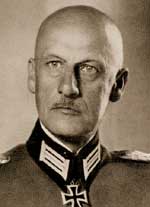Wilhelm von Leeb

Tysk general, senere feltmarskal.
- Frankrig, 1940
- Sovjetunionen, 1941-44
- Leningrad, 1941-44
Wilhelm von Leeb blev født i Landsberg og sluttede sig til den kejserlige tyske hær i 1895 som en officers-kadet. Efter at være udnævnt til officer ved artilleriet gjorde kan tjeneste i Kina under Boxeropstanden. H<n stuterede senere ved Det Bayerske Krigsakademi i München (1907-09) og gjorde tjeneste ved general-staben i Berlin (1909-11). Promoted to captain, he did a tour of duty as a battery commander in the Bavarian 10th Field Artillery Regiment at Erlangen (1912-13). At the outbreak of World War I Leeb was on the General Staff of the Bavarian Army Corps. During the war he served with the Bavarian 11th Infantry Division on the Western Front. Upon promotion to major, he was transferred to the Eastern Front in the summer of 1916. The following year he was appointed to the staff of Crown Prince Rupprecht of Bavaria. After the war Leeb remained in the German Army. In 1923, he was involved in putting down the Beer Hall Putsch. He then commanded Germany's Seventh Military District as a lieutenant general before the rise of Hitler and the Nazi Party.
Hitler was not fond of Leeb due to his anti-Nazi attitudes and religious convictions. However, due to his outstanding credentials, Hitler made him commander of the Second Army Group and he took part in the occupation of Sudetenland in 1938.
Hitler promoted Leeb to the commander of Army Group and his troops were responsible for breaking through the Maginot Line in France. For his role in this victory Leeb was promoted to the rank of Field Marshal (>Generalfeldmarschall) in July 1940, along with receiving the Iron Cross.
Leeb, now having Hitler's faith, was responsible for carrying out the attack on the Soviet Union in the northwestern sector and von Leeb was put in command of Army Group North in Operation Barbarossa. Leeb was to destroy Soviet units in the Baltic area, capture all Soviet naval bases on the Baltic, and Leningrad by July 21, 1941.
When the invasion of the Soviet Union began on June 22, 1941, Leeb's armies met with outstanding success against an overwhelmed Soviet force. By the end of September his army had advanced 900 km into the Soviet Union and had surrounded Leningrad. Hitler, however, was not pleased and said of the Field Marshal, "Leeb is in a second childhood; he can't grasp and carry out my plan for the speedy capture of Leningrad. He fusses over his plan of assuming the defensive in the northwestern sector and wants a drive in the center on Moscow. He's obviously senile, he's lost his nerve, and like a true Catholic he wants to pray but not fight." In December 1941 Leeb was relieved of his command and it was officially announced that he had stepped down voluntarily due to illness. Colonel General Georg von Küchler assumed command of Army Group North.
After the war, von Leeb was tried by a U.S. military tribunal in Nuremberg in the High Command Trial. He was found guilty on one of four charges and sentenced to three years' imprisonment, but was released after the judgment because he had already spent more time in custody.